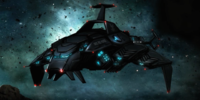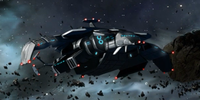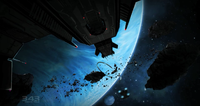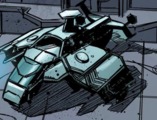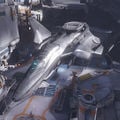Prowler: Difference between revisions
From Halopedia, the Halo wiki
(That is what the template is for.) |
|||
| Line 72: | Line 72: | ||
File:UNSC Aladdin - HQ.png|{{UNSCShip|Aladdin}} | File:UNSC Aladdin - HQ.png|{{UNSCShip|Aladdin}} | ||
File:Invasion; Circumference.png|{{UNSCShip|Circumference}} | File:Invasion; Circumference.png|{{UNSCShip|Circumference}} | ||
File:H5G-CFAcrisius.jpg|''[[ONI Acrisius]]'', a [[Winter-class prowler]] stationed aboard the ''[[UNSC Argent Moon]]'' | |||
File:Prowler-Halo Wars-Genesis.jpg|A prowler exiting slipspace | File:Prowler-Halo Wars-Genesis.jpg|A prowler exiting slipspace | ||
</gallery> | </gallery> | ||
Revision as of 22:43, November 28, 2015
The prowler is a variety of stealth-capable corvettes within the UNSC Navy.[1] Most prowlers are crewed by Office of Naval Intelligence personnel serving under the Prowler Corps, with only a few ships operated by FLEETCOM.[2]
Although most prowlers are classified as corvettes, the term can be used to refer to a stealth ship of any size; the stealth cruiser Point of No Return was noted as being the largest prowler-class vessel ever built.[3]
Specifications
Role
Prowlers are used to gather electronic intelligence. Their primary role is to stay hidden while safely gathering such intelligence, avoiding direct combat due to its light weapons and armor. Because of their tactical value and potential to change the outcome of any given combat situation, every UNSC battle group has at least one prowler assigned to its ranks.[4] The prowler's only combat role, besides active combat monitoring and recording, is discreetly laying cloaked fields of HORNET nuclear mines in orbital regions. Prowlers must have the capability to hide even within their own fleet to avoid being tracked in the event a UNSC ship fell into enemy hands.[5]
A typical prowler has a crew of 90,[6] although the craft can operate with a far smaller crew or entirely autonomously with an onboard smart AI.[7]
Stealth systems
Prowlers avoid detection through the use of physical features designed for low observability, low-profile sensor systems, and an array of stealth systems intended to mask the ship from both visual and sensor detection.[8] The outer hull is coated with stealth ablative coating, which hides the ship's radar signature and acts as a simple form of active camouflage. This camouflage is maintained by a system known as the texture buffer.[9] Engine emissions are hidden via the use of heat sinks[8] and systems known as ablative baffles and engine dampers, which enable the prowler to appear to sensors the same temperature as the surrounding space, thus avoiding detection by infrared-range sensors.[10] Because prowlers inevitably release some emissions, their systems are designed distort their signatures to appear as wreckage, low-threat vessels, or even friendly craft.[8]
A prowler is able to stay in stealth mode for days or weeks,[11] although they are not fully undetectable.[8] Past fifteen minutes in a combat theater, detection by Covenant sensors is noted to grow at a geometric rate.[12] Prowler captains receive extensive training in the use of astronomical objects to their advantage in hiding their presence, as well as the deployment of drone networks to maintain concealment during missions.[8] There is also a tradeoff between speed and stealth, and prowler commanders are forced to walk a fine balance when optimizing their stealth systems and engine power.[13]
The active camouflage systems of Covenant War-era prowlers were crude in comparison to Covenant active camouflage, operating on a seemingly similar principle as the SPI armor's photoreactive panels. For example, the Template:UNSCship's stealth coating was fairly unstable, making the ship waver to and from visibility uncontrollably especially when exposed to rapidly changing backgrounds, such as the clouds of a gas giant.[14] However, over the course of the war, research into Covenant technology allowed the UNSC to develop more effective forms of cloaking,[15] namely a form of camouflage field which surrounds the ship similar to Covenant active camouflage.[16] The reverse-engineering of active camouflage systems and limited integration of Forerunner baffler sensor distortion technology has enhanced the vessels' inherent stealth capabilities, allowing prowlers to avoid or defeat detection techniques that the Covenant had developed during the war.[8]
Sensors
Prowlers are equipped with a wide variety of sensor equipment and electronic warfare devices, many of them mounted in a sensor array located in the craft's nose.[17] The ships possess an X-ELF radar system,[18] a mass spectrometer,[19] lidar,[20] as well as EMP dampers which isolate the ship's electronics in the event of electromagnetic pulse strikes.[21] The post-war prowler UNSC Port Stanley was upgraded with a high-fidelity real-time holographic mapping suite which enables the generation of highly accurate images of a given area when working in concert with the prowler's subsidiary drones and other sensors.[20]
Prowlers are equipped with a number of deployable BLACK WIDOW communications satellites to provide sensor and communications coverage in a local operations theater.[22]
Armament
A prowler's primary offensive armament is an array of HORNET nuclear mines with vacuum-enhanced loads and a dedicated chamber to cool them down to the temperature of the vacuum of space.[23] However, it is impossible to maintain stealth when exiting slipspace with nuclear weapons onboard, as they emit a detectable Cherenkov radiation flare upon transmission from slipspace to normal space. As a result, prowlers are forced to jettison their nuclear mines into slipspace if a cloaked exit is necessary.[10]
Prowlers also possess a pulse laser weapon[24] and can be equipped with more powerful weaponry, such as Shiva or Rudra-class nuclear warheads.[25]
Known prowler classes
- Eclipse-class prowler
- Razor-class prowler
- Sahara-class heavy prowler
- Winter-class prowler
- Stealth cruiser
Subprowlers
"Subprowler" is an informal designation for stealth-capable smallcraft – often deployed by larger prowlers – that are used to infiltrate and exfiltrate personnel and cargo from planetary surfaces. Though designed with low-observable technologies, subprowlers also feature a series of electronic countermeasures and decoy capabilities that increase their survivability in the dangerous period when entering and exiting atmospheres, or when operating near advanced aerospace defenses.[8]
Known prowlers
Gallery
Red Horse navigates Installation 04's debris field
Red Horse releases a Pelican dropship from her ventral launch bay
ONI Acrisius, a Winter-class prowler stationed aboard the UNSC Argent Moon
- Prowler-Halo Wars-Genesis.jpg
A prowler exiting slipspace
List of appearances
- Halo: The Fall of Reach (First appearance)
- Halo: First Strike
- Halo: Ghosts of Onyx
- Halo: The Cole Protocol
- Halo Wars: Genesis
- Halo: Evolutions - Essential Tales of the Halo Universe
- Halo: Fall of Reach
- Halo: Glasslands
- Halo: The Thursday War
- Halo 4
- Halo: Initiation
- Halo: Escalation
- Halo: Mortal Dictata
- Hunt the Truth (Mentioned only)
- Halo: Last Light (Mentioned only)
- Halo 5: Guardians
Sources
- ^ Halo: The Fall of Reach, page 281
- ^ Halo: The Fall of Reach, page 162
- ^ Halo: Ghosts of Onyx, page 43
- ^ Halo: Ghosts of Onyx, page 329
- ^ Halo: The Thursday War, page 318
- ^ Halo: Ghosts of Onyx, page 186
- ^ Halo: Glasslands
- ^ a b c d e f g Halo Waypoint - Universe: ONI Prowler
- ^ Halo: Ghosts of Onyx, page 291
- ^ a b Halo: Ghosts of Onyx, pages 187, 43
- ^ Halo: Ghosts of Onyx, page 288
- ^ Halo: Ghosts of Onyx, page 289
- ^ Halo: Ghosts of Onyx, page 293
- ^ Halo: Evolutions, "The Impossible Life and the Possible Death of Preston J. Cole", page 477
- ^ Halo 4: The Essential Visual Guide, page 190
- ^ Spartan Ops, Catherine
- ^ Halo: Ghosts of Onyx, page 184
- ^ Halo: Ghosts of Onyx, page 290
- ^ Halo: Ghosts of Onyx, page 185
- ^ a b Halo: Mortal Dictata, pages 290-291
- ^ Halo: Ghosts of Onyx, page 328
- ^ Halo: Ghosts of Onyx, page 376
- ^ Halo: Ghosts of Onyx, page 325-326, 329
- ^ Halo: Ghosts of Onyx, page 50
- ^ Halo: The Thursday War, page 320
